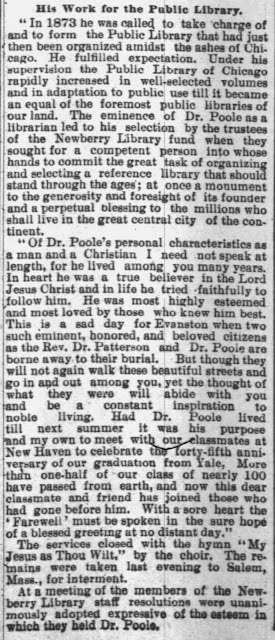Then remembered my subscription to Fold3 that I get with my Connecticut Society of Genealogists subscription, which I had never used before. See post about my Fold3 subscription. My search words were: William Frederick Poole + pallbearers. It was so easy and wow, what results. A nice long report about his funeral and the names of all 14 honorary pallbearers.
The deceased was my 2nd great-grandfather, and the person of whom I wrote about in the Longest Obituary I've Ever Seen.
From The Chicago Tribune, March 2, 1894, Page 8
From The Chicago Tribune, March 4, 1894, Page 3
SCHOLARS
DO HIM HOMAGE.
They Pay
the Last Meed of Affection to
Librarian
W. F. Poole.
Funeral services for Dr. William F. Poole,
librarian of the Newberry Library, were held yesterday afternoon at Evanston
At 3 o’clock the funeral procession
entered the church to the strains of Beethoven’s funeral march. The honorary
pallbearers preceded the casket. They were President Henry Wade Rogers of Northwestern University ,
Dr. Daniel Bonbright, President William R. Harper of Chicago University; H. J.
Willing, trustee of the Newberry Library; Daniel L. Shorey and James L. High of
the Chicago Literary club; Edward G. Mason, President of the Chicago Historical
Society; Norman Williams, trustee of the Crerar Library; Emil G. Hirsch,
President of the Board of Trustees of the Chicago Library; Librarian Frederick
H. Hild; and Edward S. Isham, Franklin MacVeagh, George E. Adams, and John P.
Wilson, the present Board of Trustees of the Newberry Library. Representatives
of the Public Library Board who were present were: John G. Shortall, Pliny B.
Smith, Bernhard Moos, and Secretary W. B. Wickersham. The active pallbearers
were Charles Evans, Dr. Carl Pietssch, and Dr. G. F. Wire, assistants of Dr.
Poole in the Newberry Library, and J. R. Patterson, W. A. Purer, and Reidar
Arentz, who had formerly been assistants in the Chicago Public Library.
The services were opened by the church
choir with the hymn, “Beyond the Sighing and the Weeping.” Dr. J. F. Loba read the scripture funeral
service and offered prayer. When “The Homeland” had been sun by the choir Dr.
Loba said in part:
“Every man lives a twofold life; one is
that inner life of the heart with the aims and hopes, the sorrows and joys, the
godward life which no one can see. The other is the manward life, the fruit,
the product which the man gives to the world and on which his reputation rests.
These two do not always coincide—sometimes lack much of it. But the perfect
harmony of the two gives to the whole life the force of truth, harmony in the
soul, and power to the work of man. The life of our dear friend was peculiarly
great in the
Harmony
between the ideal and the real. He was a great worker on the highest plane of
human activities. He enriched the world of thought, he ruled in the realm of
books, and like some great spirit he presided over the very source of human
learning. In the midst of our sorrows and through our cares we may thank God
for such a man.”
Dr.
Franklin Fisk’s Tribute.
Following Dr. Loba an address was given by
Dr. Franklin Fisk, President of the Chicago Theological Seminary and a former
classmate of Dr. Poole at Yale. He said:
“The sorrowful event that has brought
together this large congregation of friends to do honor to one who has for
years occupied so large a place in our thoughts and in our esteem is to me peculiarly
sad. Dr. Poole was my classmate at Yale. Our acquaintance, which began when we
entered that ancient university in 1845, ripened long since into affectionate
reward, and through nearly half a century has borne delightful fruitage. When
he joined our class a few months after we entered college I well remember the
marked impression he made. Although somewhat reserved in manner he had a genial
nature and soon made many warm friends. He was old enough when he entered
college to appreciate the value of a liberal education, and addressed himself
to his studies in a manly way. But while faithful and successful in the studies
of the college curriculum, he did not limit himself to them, but pushed his
reading and study in all directions, especially in the domain of periodical
literature. He early evinced a great love of books and revealed in libraries,
and his love and knowledge of books led to his selection by ‘Brothers in
Unity,’ a literary society in the college, as librarian of its library of some
12,000 volumes. In this capacity he early discovered a great need of an indeed to general periodical
literature—for the supply of which he even then, while yet a college student,
addressed himself, and persisted in the great work with marvelous industry and
energy through nearly half a century to the very close of his life. The
development of his index from its inception is a genuine instance of evolution.
His Work
for the Public Library.
“In 1873 he was called to take charge of
and to form the Public Library that had just then been organized amidst the
ashes of Chicago
“Of Dr. Poole’s personal characteristics as
a man and a Christian I need not speak at length, for he lived among you many
years. In heart he was a true believer in the Lord Jesus Christ and in life he
tried faithfully to follow him. He was most highly esteemed and most loved by
those who knew him best. This is a sad day for Evanston New Haven
The services closed with the hymn “My
Jesus as Thou Wilt,” by the choir. The remains were taken last evening to Salem , Mass.
At a meeting of the members of the
Newberry Library staff resolutions were unanimously adopted expressive of the
esteem in which they held Dr. Poole.

